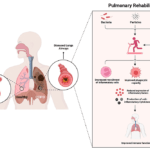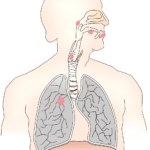
In the realm of pulmonary rehab, patients take charge of their journey towards better lung health. Through a carefully designed program, individuals with chronic lung conditions engage in a range of activities aimed at improving their respiratory function, physical endurance, and overall well-being. From endurance exercises and strength training to educational sessions and self-management techniques, pulmonary rehab equips patients with the tools and knowledge needed to take control of their condition, breathe easier, and lead a more fulfilling life.

Exercise
In pulmonary rehabilitation, exercise plays a crucial role in improving cardiovascular health and overall physical fitness. There are three main types of exercises that are often incorporated into pulmonary rehab programs: cardiovascular exercises, strength training, and flexibility exercises.
Cardiovascular exercises
Cardiovascular exercises, also known as aerobic exercises, are essential for improving the efficiency of your heart and lungs. These exercises increase your heart rate and improve the circulation of oxygen throughout your body. Some common cardiovascular exercises that may be included in pulmonary rehab programs are walking, cycling, swimming, and using a stationary bike or treadmill. These exercises help strengthen your respiratory muscles, improve endurance, and reduce shortness of breath.
Strength training
Strength training exercises focus on building and strengthening your muscles, including those involved in breathing. These exercises usually involve lifting weights or using resistance bands. By incorporating strength training into your pulmonary rehab routine, you can increase your muscle mass, improve your posture, and enhance your overall strength and stamina. Strong muscles help support your respiratory system and make breathing more efficient.
Flexibility exercises
Flexibility exercises, such as stretching and yoga, are vital for improving the range of motion in your joints and muscles. These exercises help reduce muscle stiffness, improve posture, and enhance your overall body flexibility. In pulmonary rehab, flexibility exercises are important to maintain good posture and ensure that your respiratory muscles can function optimally. These exercises can also help alleviate muscle tension and promote relaxation, which can be beneficial for individuals managing respiratory conditions.
Breathing Techniques
Proper breathing techniques are an essential component of pulmonary rehab. They can help improve lung capacity, increase oxygen intake, and reduce shortness of breath. Here are three commonly taught breathing techniques in pulmonary rehab:
Diaphragmatic breathing
Diaphragmatic breathing, also known as belly breathing, involves breathing deeply into your diaphragm to allow your lungs to fully expand. To practice this technique, sit or lie down comfortably and place one hand on your abdomen. As you breathe in, imagine your belly rising and filling with air. Exhale slowly and let your belly fall. Diaphragmatic breathing helps strengthen your diaphragm and lower respiratory muscles, optimizing your breathing efficiency.
Pursed lip breathing
Pursed lip breathing is a technique that involves inhaling slowly through your nose and exhaling through pursed, or partially closed, lips. This method helps regulate and slow down your breathing rate, improving the exchange of oxygen and carbon dioxide in your lungs. Pursed lip breathing can be particularly helpful during activities that require more effort, such as climbing stairs or lifting heavy objects.
Lateral costal breathing
Lateral costal breathing focuses on expanding your ribcage outward as you inhale, allowing your lungs to fill with air. To practice this technique, place your hands on the sides of your ribcage. As you breathe in, concentrate on expanding your ribcage and feeling your hands move apart. Exhale slowly and allow your ribcage to relax. Lateral costal breathing encourages optimal lung expansion and can improve overall respiratory function.
Education and Counseling
In pulmonary rehab, education and counseling play a crucial role in helping individuals understand their respiratory system, manage their condition, and make necessary lifestyle changes. Here are a few topics that are often covered during education and counseling sessions:
Understanding the respiratory system
Understanding how your lungs and respiratory system work can empower you to take better care of your respiratory health. Education sessions in pulmonary rehab provide valuable information about the anatomy and physiology of the respiratory system, as well as how various respiratory conditions impact lung function. This knowledge can help you make informed decisions about managing your condition and following appropriate treatment plans.
Managing medications
Proper management of medications is essential for individuals with respiratory conditions. Education sessions in pulmonary rehab often cover topics such as the correct usage and potential side effects of inhaled medications, oral medications, and other respiratory therapies. The goal is to ensure that you understand your prescribed medications, their purpose, and how to take them effectively to achieve optimal symptom control and lung function.
Nutrition and diet
Nutrition plays a significant role in maintaining overall health, including respiratory health. In pulmonary rehab, dietitians or nutritionists may provide guidance on making healthy food choices and managing any dietary restrictions that may be necessary due to your respiratory condition. Education sessions may cover topics such as the importance of a balanced diet, the role of specific nutrients in respiratory health, and strategies for maintaining a healthy weight.
Psychological Support
Living with a respiratory condition can often be emotionally challenging. Pulmonary rehab programs recognize the importance of psychological support in ensuring overall well-being. Here are a few areas that may be addressed during psychological support sessions:
Coping with anxiety and depression
Anxiety and depression are common among individuals with respiratory conditions, as they can significantly impact quality of life. Psychological support sessions in pulmonary rehab may provide strategies for coping with anxiety and depression, such as relaxation techniques, mindfulness exercises, and guided imagery. These sessions aim to help you better manage the emotional aspects of living with a respiratory condition.
Stress management techniques
Managing stress is crucial for individuals with respiratory conditions as stress can exacerbate symptoms and hinder overall well-being. Pulmonary rehab programs often offer stress management techniques, such as deep breathing exercises, meditation, and stress reduction strategies. Learning to effectively manage stress can help improve your respiratory function and enhance your overall quality of life.
Goal setting and motivation
Setting achievable goals and staying motivated are important factors in pulmonary rehab. Psychological support sessions may focus on helping you set realistic goals related to your respiratory and overall well-being. These goals can provide a sense of purpose and motivation, helping you stay committed to your rehabilitation journey. By working with healthcare professionals and setting attainable milestones, you can measure your progress and celebrate achievements along the way.

Medical Assessment
Medical assessments are an integral part of pulmonary rehab programs. These assessments help healthcare professionals understand your lung function, track progress, and tailor the treatment plan to your specific needs. Here are a few common medical assessments conducted in pulmonary rehab:
Lung function tests
Lung function tests, such as spirometry and lung volume measurements, provide valuable information about your lung capacity, airflow, and overall respiratory function. These tests involve breathing into a device that measures various parameters, allowing healthcare professionals to assess lung function and determine the severity of your respiratory condition. Lung function tests may be performed before starting pulmonary rehab and periodically throughout the program to monitor progress.
Monitoring oxygen levels
For individuals with respiratory conditions that require supplemental oxygen, regular monitoring of oxygen levels is crucial. In pulmonary rehab, healthcare professionals may use pulse oximeters to measure your blood oxygen saturation levels. This helps ensure that you are receiving adequate oxygen and allows for adjustments to your supplemental oxygen therapy, if necessary. Monitoring oxygen levels during exercise and rest can provide valuable insights into how your respiratory system is functioning.
Evaluating progress
Regular evaluation of your progress is essential to gauge the effectiveness of your pulmonary rehab program and make necessary adjustments. Healthcare professionals will assess various aspects of your respiratory health, such as improvements in lung function, exercise capacity, and symptom management. These evaluations may involve physical examinations, reviewing lung function test results, and assessing your overall well-being. Based on these assessments, adjustments and modifications can be made to your treatment plan to maximize benefits and address any ongoing challenges.
Disease Management
Pulmonary rehab is designed to help individuals better manage their respiratory condition and prevent exacerbations. Here are a few key components of disease management in pulmonary rehab:
Understanding the underlying condition
To effectively manage a respiratory condition, it’s crucial to have a solid understanding of the underlying condition, including its causes, symptoms, and triggers. Education sessions in pulmonary rehab focus on providing individuals with comprehensive knowledge about their specific respiratory condition. This knowledge enables you to recognize early signs of exacerbations, make appropriate lifestyle adjustments, and seek timely medical intervention when needed.
Managing symptoms
Symptom management is an important aspect of disease management in pulmonary rehab. Healthcare professionals will work with you to develop personalized strategies for managing symptoms such as shortness of breath, coughing, and wheezing. Techniques like pursed lip breathing, diaphragmatic breathing, and medication management can help alleviate symptoms and improve your ability to perform daily activities with greater ease.
Preventing exacerbations
Preventing exacerbations and minimizing the impact of respiratory flare-ups is a key goal of pulmonary rehab. During education sessions, healthcare professionals may provide guidance on recognizing and avoiding triggers that can lead to exacerbations, such as exposure to allergens or respiratory infections. They may also teach techniques for effectively managing exacerbations if they do occur, including when to seek medical assistance and how to use emergency medications or treatments.

Smoking Cessation
Smoking cessation is a critical component of pulmonary rehab for individuals who smoke or have a history of smoking. Quitting smoking is perhaps the most effective measure for preventing further respiratory damage and improving overall lung health. In pulmonary rehab programs, healthcare professionals provide support and resources to help individuals quit smoking. Here are a few strategies that may be utilized:
Quitting strategies
Various quitting strategies, such as behavioral therapies and pharmacological interventions, can significantly increase the chances of successfully quitting smoking. Healthcare professionals in pulmonary rehab may offer counseling and support to help you identify and implement the most suitable quitting strategy for your needs. This may include setting a quit date, creating a supportive environment, and finding alternative coping mechanisms for stress and cravings.
Nicotine replacement therapy
Nicotine replacement therapy (NRT) is a commonly used method for easing nicotine withdrawal symptoms and minimizing cravings during the quitting process. NRT can include nicotine patches, gum, inhalers, nasal sprays, or lozenges. In pulmonary rehab, healthcare professionals can provide guidance on choosing and using the appropriate NRT products, taking into consideration your specific respiratory condition and any potential interactions with other medications.
Support groups
Support groups can provide invaluable support and encouragement throughout the smoking cessation journey. In pulmonary rehab, healthcare professionals may connect you with local support groups or online communities where individuals facing similar challenges can share experiences, provide motivation, and offer guidance. Joining a support group can give you a sense of belonging and provide you with a network of individuals who understand the struggles and triumphs of quitting smoking.
Pulmonary Rehabilitation Team
Pulmonary rehab programs typically involve a multidisciplinary team of healthcare professionals who work together to provide comprehensive care and support. The following professionals are commonly involved in pulmonary rehab:
Physicians
Physicians, such as pulmonologists or primary care doctors, play a vital role in overseeing your pulmonary rehab program. They are responsible for assessing your overall health, prescribing medications, and monitoring your progress throughout the program. Physicians work closely with the rest of the pulmonary rehabilitation team to ensure that your treatment plan is tailored to your specific needs.
Nurses
Nurses are essential members of the pulmonary rehab team. They provide hands-on care, monitor vital signs, administer medications, and assist you with any medical procedures or treatments. Nurses may also provide education on self-care and disease management, ensuring that you understand and can effectively implement the strategies learned during pulmonary rehab.
Respiratory therapists
Respiratory therapists specialize in evaluating and treating respiratory conditions. In pulmonary rehab, they play a crucial role in designing and implementing exercise programs tailored to your specific needs. Respiratory therapists are experts in breathing techniques and may provide individualized instruction to help improve your respiratory muscle strength and breathing efficiency. They also assist with lung function tests and offer guidance on managing respiratory symptoms.
Physical therapists
Physical therapists are trained professionals who focus on improving physical function and mobility. In pulmonary rehab, physical therapists help individuals develop exercise routines and build strength, endurance, and flexibility. They may also provide assistance with gait training, balance exercises, and activities of daily living. Physical therapy can enhance overall physical fitness, reduce the risk of falls, and improve functional abilities.
Psychologists
Psychologists play an essential role in addressing the psychological and emotional aspects of living with a respiratory condition. They provide counseling, guidance, and support in coping with anxiety, depression, and stress. Psychologists may also help individuals explore strategies to enhance motivation, set goals, and develop positive coping mechanisms. Their expertise can significantly contribute to overall well-being and improve the success of pulmonary rehab.
Home Exercise Programs
Continuing the progress made during pulmonary rehab is crucial for maintaining and improving your respiratory health. To achieve this, many pulmonary rehab programs provide individuals with home exercise programs tailored to their specific needs and goals. These programs are designed to help you continue exercising independently outside of the rehab facility. Here are a few key aspects of home exercise programs:
Continuing the progress outside of rehab
Home exercise programs are designed to facilitate the continuation of your rehabilitation journey once you have completed your formal pulmonary rehab program. These programs provide detailed instructions on the exercises and breathing techniques learned during rehab, ensuring that you can continue practicing them at home. By maintaining a consistent exercise routine, you can further enhance your physical fitness, respiratory muscle strength, and overall lung function.
Setting goals and maintaining routines
Home exercise programs often include goal-setting strategies to help you stay motivated and track your progress. These goals may focus on increasing exercise duration, improving endurance, or achieving specific milestones related to your respiratory health. By setting achievable goals and maintaining a regular exercise routine, you can continue to experience the benefits of pulmonary rehab and make a positive impact on your respiratory condition.
Community Resources
In addition to the support provided within the pulmonary rehab program, community resources can further enhance your overall well-being and provide a network of support. Here are a few community resources that individuals in pulmonary rehab may find helpful:
Local support groups
Local support groups provide an opportunity to connect with individuals who are experiencing similar challenges. These groups often meet regularly to share experiences, exchange information, and provide emotional support. Joining a local support group can help individuals in pulmonary rehab feel less isolated, receive practical advice, and find encouragement on their journey to respiratory health.
Online forums and communities
The internet offers a wealth of resources for individuals in pulmonary rehab. Online forums and communities dedicated to respiratory health provide a platform to connect with others, ask questions, and share experiences. These virtual communities can offer a sense of belonging and be a valuable source of information and support, especially for individuals who may not have local support groups readily available.
Educational workshops
Educational workshops on respiratory health are often organized by healthcare organizations, pulmonary rehab programs, or community centers. These workshops offer opportunities to learn more about your respiratory condition, the latest advancements in treatment, and self-management strategies. Attending these workshops can help you stay informed and empowered, enabling you to actively participate in your own respiratory health management.
In conclusion, pulmonary rehab encompasses a comprehensive approach to improving the respiratory health and overall well-being of individuals with respiratory conditions. Through exercises, breathing techniques, education, psychological support, medical assessments, disease management strategies, smoking cessation assistance, a multidisciplinary team, home exercise programs, and community resources, pulmonary rehab aims to empower individuals to live fuller, healthier lives despite their respiratory challenges. By participating in pulmonary rehab, you can take control of your respiratory health, enhance your quality of life, and optimize your long-term prognosis.









